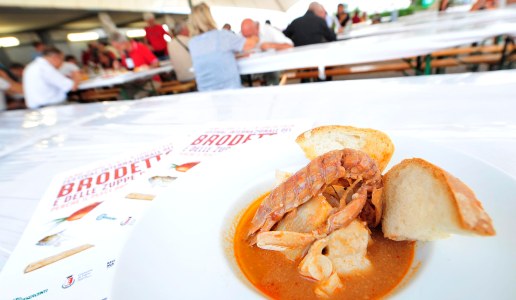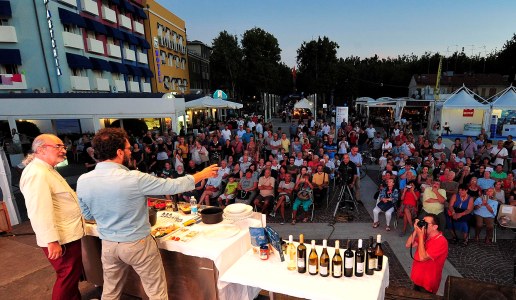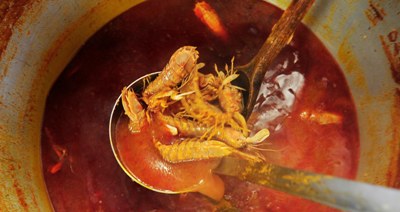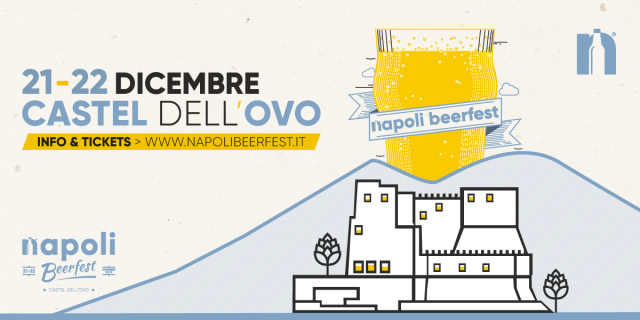Eros, “ciò” and Brodetto alla Fanese

A typical Mediterranean fish soup that in Fano has a particular flavor, one linked with the lives of the “portulotti”.
At the beginning of July, I went to my home city of Fano for the International Festival of Brodetto and Zuppa di Pesce. If there is one common denominator between all the cuisines of countries bordering on the Mediterranean it is zuppa di pesce(fish soup/stew). It is made in many different ways depending on the ingredients used, the way it is cooked, the spices added and how it is presented. In Fano, it has always been called Brodetto alla Fanese and it was the first Italian zuppa di pesce recipe that was written down and officially published in a cookbook: Ada Boni’s The Talisman of Happiness. This alone is sufficient to explain how important Brodetto is and why for 16 years it has been the focus of an international festival that also includes other Mediterranean zuppa di pesce versions. The enormous success of the festival is thanks to it being updated every year by the organizers and Ezio Vizzari, a great friend of the festival who is also the editor of the Espresso Guides. For the 2011 edition of the festival, when I still had my restaurant in Monopoli, he wanted me to participate as a competitor. This time, however, I went to report on things to do with food and wine.
 In this article dedicated to the festival, I would like to explain the character of brodetto, how to interpret it, listen to it and fall madly in love with it. For a Fano native this was easy, I have it in my blood, a kind of taste imprinting. I hope that after you read this article you will undergo a kind of blood transfusion and brodetto will be in yours, too.
In this article dedicated to the festival, I would like to explain the character of brodetto, how to interpret it, listen to it and fall madly in love with it. For a Fano native this was easy, I have it in my blood, a kind of taste imprinting. I hope that after you read this article you will undergo a kind of blood transfusion and brodetto will be in yours, too.
Brodetto is a fish soup that fishermen would cook (and continue to cook) onboard when they were out to sea. They used the poorer fish, the ones that they could not sell, and made a warm, comforting soup or broth, hence the name brodetto. It was a dish consumed by the crew and their families. Historically, the fishermen were very poor, worn down by the sea air and full of aches and pains from their labors, who sometimes died at sea. On land, they all lived around the port, in small, rundown and damp houses. They were nicknamed “portulotti”, inhabitants of the port. It was almost a derogatory term that they lived with all their lives. For those who want to know the real story of the poor who lived from and on the sea, up until only recently, I suggest reading two beautiful publications by Sergio Anselmi: History of the Adriatic and The Last
Stories of the Adriatic. Truly a must.
In Fano, the port and the portulotti were a world apart, looked down upon by the city’s other residents. Even their names were (and sometimes still are) different. Fano has always been a left-leaning city politically, a reaction to the domination of the Church State, but in port they were really leftwing. For examples, when a family had a son or daughter, the portulotti would give them a name that had no connection with any saint: Eros, Libero, Ares, Ellade, Paride, Achille, Primo, Secondo, Terzo, Giove, Marte, Plutone, Mercurio and so on.
And during the Fascist Era, the Fascists never went to the port. They tried once and marched in wearing their Black Shirts intent on “conquering” the port. But at the entrance to the port area they were met by the portulotti who opened fired at their feet and the intrepid group made a quick getaway.
 Even the dialect, the Fanese spoken by the portulotti, is different from what is spoken in the city and the surrounding countryside. It is rougher, harsher. And they had the habit of using the word “ciò”, that or this, in a particular way, with the “ò” pronounced in a more closed way. The portulotti use it for emphasis and it makes them immediately identifiable. In a way it is like how “what” is used in cockney. For example, someone speaking with a friend would say: “Lovely girl, what!”, “really good brodetto, what!, “and so on. When I was growing up, “ciò” began to also be used in the city by we who were fascinated by that part of town. Over recent decades, however, “ciò” has all but disappeared and not even the portulotti seem to use it anymore.
Even the dialect, the Fanese spoken by the portulotti, is different from what is spoken in the city and the surrounding countryside. It is rougher, harsher. And they had the habit of using the word “ciò”, that or this, in a particular way, with the “ò” pronounced in a more closed way. The portulotti use it for emphasis and it makes them immediately identifiable. In a way it is like how “what” is used in cockney. For example, someone speaking with a friend would say: “Lovely girl, what!”, “really good brodetto, what!, “and so on. When I was growing up, “ciò” began to also be used in the city by we who were fascinated by that part of town. Over recent decades, however, “ciò” has all but disappeared and not even the portulotti seem to use it anymore.
But then again even the portulotti almost don’t exist anymore. There is no longer a precise boundary between the port and the city and the fishermen, boat owners and clam pickers have become very rich. The port is now home to some of the city’s most beautiful residences and is filled with super-organized bathing establishments, fancy restaurants and ice cream bars. The port is also home to the moretta, an expresso coffee spiked with hard liquor and a lemon peel, which the portulotti typically drank. All things considered, one could say that the port and the portulotti, even if it was like a ghetto and they were looked down upon, considered poor and ignorant, in the end won out over the city. Thanks to them come two recipes that have made Fano famous.
Fano has decidedly been transformed over recent decades but Brodetto has remained unchanged. In fact, it has conquered the city and become an international draw.
Should you go to Fano, remember about Eros, “ciò” and the portulotti and you will understand why Brodetto is so distinct, with an inimitable flavor that is so good.
Let there be no doubt, Brodetto alla Fanese is the best zuppa di pesce that exists! Take my word!
P.S. The recipe for brodetto is too long to write down here, nevertheless there are a few rules that must be respected: you can use anything that comes from the sea except oily fish and clams; tomato paste can be used but not fresh tomatoes; onion is used but not garlic; vinegar and not wine; and parsley needs to be choppy roughly and added at the end when it is off the stove. Sometimes I prefer using rosemary but only if it is fresh and it is spring. What an aroma!

 Italiano
Italiano







